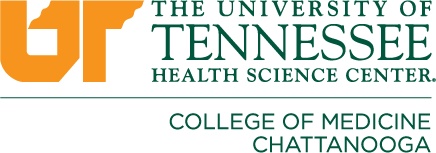OB/GYN Chattanooga Curriculum
The educational curriculum is based on the educational objectives established by CREOG. Throughout all four years, residents receive continuous experience in outpatient general obstetrics and gynecology. All levels of residents also regularly work with the maternal fetal medicine specialists during their obstetrics and night call rotations.
During the first year of training, residents rotate through the core rotations of obstetrics, gynecology, and outpatient clinic/ultrasound to establish a firm foundation in clinical knowledge.
First-year residents are assigned a rotation in GYN Oncology.
Second-year residents continue to improve their base of clinical knowledge with core rotations but expand into subspecialties with rotations in reproductive endocrinology and gynecologic oncology. Second-year residents are also given the opportunity to work with the minimally invasive gynecologic surgery fellows and attendings.
Third-year residents have further expanded roles with subspecialists in REI, oncology, MIGS, and urogynecology as well as continuing roles with core rotations. Our program has also established an optional elective month in surgical intensive care for residents in their second or third year of training.
Fourth-year residents each assume administrative and educational chief responsibilities while supervising lower level residents on core rotations. There is an opportunity during the final year of training for chief residents to tailor their educational experiences to suit their future endeavors.
Click on the hyperlink to view the Overall Block Schedule for the four-year program:
Subspecialties
The OB Hospitalist Division at the UTHSC College of Medicine Chattanooga, in conjunction with Erlanger Health system, is a team of OB/GYN physicians exclusively dedicated to caring for women before, during, and after childbirth. We manage OB emergencies, improve safety and clinical outcomes, provide 24-hour coverage of Labor and Delivery, and educate the next generatio of OBGYNs.
Faculty research interests include:
- Medical Education
- Quality Improvement
- Obstetric Simulation
Welcome to the Division of Gynecologic Oncology, Department of Obstetrics and Gynecology at the UTHSC College of Medicine Chattanooga. The Division serves as a regional referral center for patients with gynecologic cancers in the state of Tennessee and throughout the Southeast. We are a multidisciplinary team of gynecologic oncologists, nurses, and consultants providing comprehensive, compassionate care for women with cancer. Our faculty members, Dr. Stephen DePasquale, Dr. Todd Boren, and Dr. Shae Connor, are fellowship trained gynecologic oncologists specializing in advanced minimally invasive techniques for the treatment of gynecologic malignancies. The Division provides access to immediate consultations, hereditary cancer risk assessment, advanced abdominal-pelvic and minimally invasive surgical procedures including robotics, expert gynecologic cancer pathologists, comprehensive chemotherapy infusion services, rapid radiation oncology consultations, cutting edge clinical trials, and supportive care services.
Education and research are also key missions of the Division. Our faculty members actively enroll patients in both investigator-initiated and national trials, which offer women in our region access to the most promising clinical trials available. We actively participate in the training of medical students and residents within the Department of Obstetrics and Gynecology, as well as the Minimally Invasive Gynecologic Surgery fellowship.
The Maternal-Fetal Medicine (MFM) Division provides a broad scope of practice and medical care to a large geographical area, receiving transports from TN, GA, SC, and AL. The various patient populations we serve provides our residents with excellent learning opportunities. The MFM attendings directly involved with resident / medical student education include Dr. Joseph Kipikasa, Dr. Carlos Torres, Dr. Kyle Gonzales and Dr. Aalok Sanjanwala. MFM faculty are present daily during rounds and provide in-house L&D coverage from 7a – 5p daily. This provides excellent opportunities for direct learning and to focus on any areas of interest / discussion.
The section maintains a robust research endeavor that includes investigator initiated, industry supported, and grant supported efforts. They include both limited basic and fully integrated clinical trials; all efforts are welcoming to residents for participation. The division has sponsored five residents seeking MFM fellowship endeavors. The division is heavily involved in formal and informal didactics, morning report, grand rounds, and weekly Friday block time. We provide direct teaching of ultrasound along with computer sonographic simulation-based learning. The combined efforts of the division have culminated in numerous teaching awards and regularly are found at regional, state, national, and international stages for continued medical education events.
Research interests currently include heavy metal assays, enzymatic, metabolomics, and proteomics of low birth weight placentae. This effort resulted in the first NIEHS grant award DHHS/HRSA # 1H1SMC10654-01-00 to investigate basic and clinical science correlations. The division is active in preeclampsia and obstetrical hemorrhage clinical research as well as uterine physiology during preterm and term labor. There are numerous other efforts in which to be involved as a resident. To further bolster academic curiosity, our members serve regularly as peer reviewers, original research contributors, and produce book chapters.
Clinically the team has developed and led the noted Solutions to Obstetrics in Rural Communities (STORC). The STORC program was funded through a generous industry sponsored grant in 2007. It involves a vast telehealth network that allows our physicians and midlevel providers the opportunity to take care of pregnant patients in their communities. STORC has been featured at national (ACOG) and regional levels for its tremendous impact on women’s healthcare. To date the program has hosted over 50,000 visits and serves rural communities in 15 sites, including Tennessee, Georgia, and North Carolina. The program has resulted in improved perinatal and maternal outcomes and has saved over $6 million dollars in direct costs to patients due to remote accessibility. This is an additional opportunity for any future residents interested in implementing and serving a “rural” region, as we have over 10 years of experience in this developing field.
Our hospital is the only Level 4 Maternity center in southeast Tennessee, housing over 3,000 high-risk deliveries annually at the main campus and another 2,800 at the East campus, 11 miles away. The resident receives first-hand patient care exposure and is provided faculty supervision and teaching with supplemented obstetrical simulation. It also houses the region's only Level 4 NICU, with highly skilled pediatric surgeons and a full complement of pediatric subspecialists who assist in providing fetal care for patients with the best plans for their child.
Our Reproductive Endocrinology and Infertility (REI) physicians work with all the residents during their training experience with special emphasis during the 2nd and 3rd years of the program. Their office evaluations and surgical procedures offer a wide range of patients within the field of Reproductive Endocrinology and Infertility. Residents gain a basic understanding of pelvic ultrasound technology with hands-on training in reproductive organ system and pathology identification. A full service, in-office IVF center provides ultrasound follicular monitoring, sedation assisted transvaginal ultrasound guided oocyte retrieval, intracytoplasmic sperm injection (ICSI), Embryo Biopsy with Preimplantation Genetic Screening (PGS), and Embryo Transfer. The residents are fully integrated into the evaluation and therapeutic implementation of these techniques.
We also partner with the Pediatric Oncology Department at Children's Hospital at Erlanger to provide germ cell retrieval and cryopreservation of pediatric patients who need sperm and oocyte cryopreservation due to expected damage from chemotherapeutic protocols. We also work closely with the Erlanger/UT Urology Department to provide Percutaneous Epididymal Sperm Aspiration(PESA), Testicular Sperm Aspiration(TESE), Microscopic Epididymal Sperm Aspiration(MESA), and Microsurgical Mapping for Testicular Sperm Aspiration. All of these experiences provide our residents with a well-rounded REI experience.


